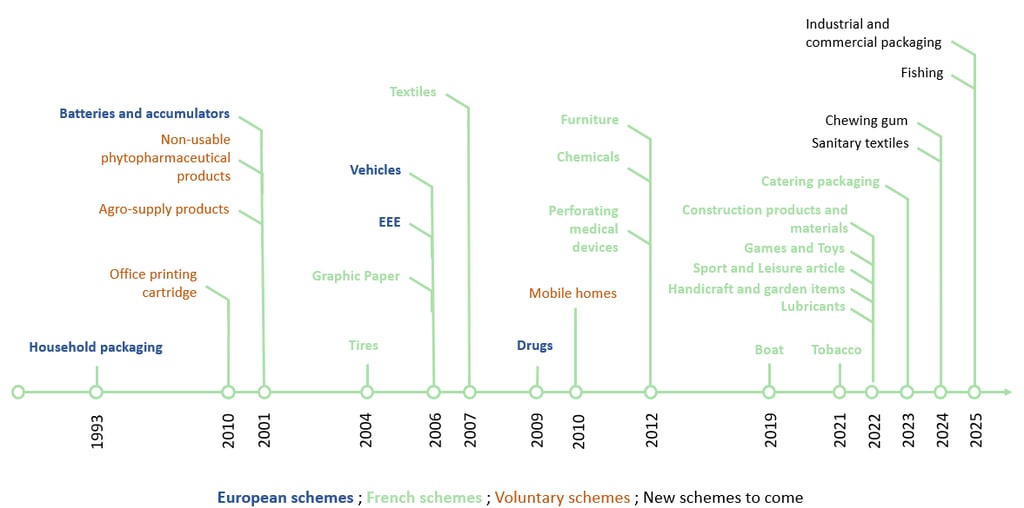

Specialist in ecotaxes and EPR schemes
EPR Scheme
Extended Producer Responsibility (EPR) is based on the "polluter pays" principle: marketers are responsible for the entire life cycle of their products, from design to end-of-life.
The history of EPR in France
The principle of EPR has been enshrined in French law since 1975. The decree of April 1, 1992 on household packaging launched the implementation of the first EPR sector in France. Subsequently, it was extended to numerous sectors such as batteries and accumulators, graphic paper, electrical and electronic equipment (WEEE), furniture, etc.
The AGEC law
The anti-waste for a circular economy law (loi Anti-gaspillage pour une économie circulaire or loi AGEC, February 2020) aims to limit waste and preserve natural resources, biodiversity and the climate. It transposed the European directive Single use plastic (SUP) and translated the proposals of the Circular Economy Roadmap.
The AGEC law transforms the EPR system thorougly with the creation of more than 11 new sectors between 2021 and 2025. The objective of the EPR system is to allow the treatment of waste generated, but also to prevent said waste by promoting eco-design and extending the life of these products while supporting repair and reuse.
EPRs subject to European legislation
The European Union has also chosen to use EPR systems, which is why certain French sectors are also subject to European legislation. This concerns household packaging, batteries and accumulators, electrical and electronic equipment, discarded vehicles and medicines.


Timeline of EPR scheme
The different EPR channels
European schemes
➲ 1993 : Household packaging (CITEO formerly Eco-emballage, ADELPHE and LEKO)
➲ 2001 : Batteries and accumulators (SCRELEC and Corepile)
➲ 2006 : Electrical and Electronic Equipment (EEE) (Ecologic for categories 1, 2, 4, 5, 6 and 8; Ecosystem for categories 1, 2, 3 (professional only), 4, 5, 6 and 8 (household only); Soren for category 7; Ocad3e oversees the 3 eco-organizations)
➲ Vehicles (No eco-organization)
➲ 2009 : Drugs (Cyclamed)
French schemes
➲ 2004 : Tires (Aliapur and AVPUR for Reunion Island)
➲ 2006 : Graphic papers (CITEO)
➲ 2007 : Textiles (Re-Fashion formerly Eco-TLC)
➲ 2012 : Furniture (Eco-Maison formerly Eco-mobilier (household); Valdelia (professional))
➲ Chemicals (EcoDDS; PYRéO (pyrotechnic products); Ecosystèm (extinguishers))
➲ Perforating medical devices (DASTRI)
➲ 2019 : Boat (APER)
➲ 2021 : Tobacco (ALCOME)
➲ 2022 : Mineral and synthetic oils, lubricants and industrial oils (Lubricants) (CYCLEVIA)
➲ Handicraft and garden items (Eco-Maison; Ecologic for thermal items; EcoDDS for painters' tools items)
➲ Sport and Leisure article (Ecologic)
➲ Games and Toys (Eco-Maison)
➲ Construction products and materials (Valobat for categories 1 and 2; Eco-minero for category 1; Eco-Maison and Valdélia for category 2)
➲ 2023 : Catering packaging (CITEO)
Voluntary schemes
➲ 2000 : Office printing cartridge (Ecologic (household) and SCRELEC (professional))
➲ 2001 : Agro-supply products (ADIVALOR)
➲ Non-usable phytopharmaceutical products (ADIVALOR)
➲ 2010 : Mobile homes (Eco Mobil-Home)
New schemes to come
➲ 2024 : Sanitary textiles (awaiting approval)
➲ Chewing gum (awaiting approval)
➲ 2025 : Fishing (awaiting approval)
➲ Industrial and commercial packaging (awaiting approval)
